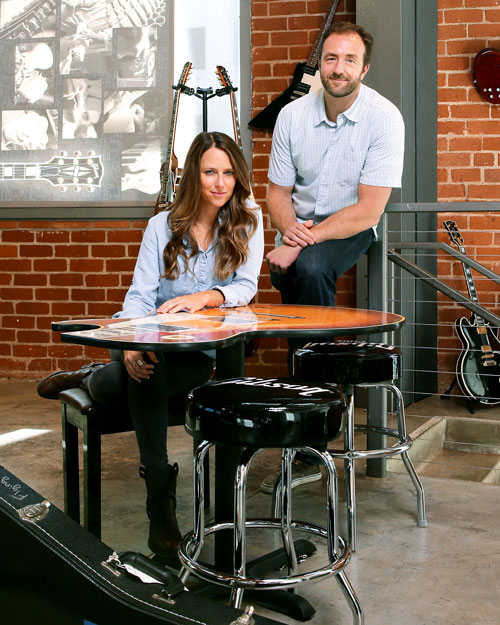As fans flock to music festivals across the United States, Live Nation Entertainment is seizing the trend with strategic investments in events like Austin City Limits, Bonnaroo, Lollapalooza, and Electric Daisy Carnival (EDC).

“Festivals are a very hot space,” says Dan Palumbo, Live Nation’s senior vice president of mergers and acquisitions (M&A) and corporate legal affairs. “There have been a lot of them up for sale recently. It’s definitely an area we’ve been focused on of late, and it makes for some pretty exciting deals.”
The Beverly Hills-based publicly traded firm has grown to become the largest live entertainment company in the world, with a hand in nearly every aspect of the live music industry, from concert promotions to ticket sales and venue operation to artist management.
Live Nation produces thousands of concerts in thirty-three countries and more than sixty festivals throughout the globe each year. It operates twelve House of Blues locations nationwide along with 146 other venues in six countries. The 2009 merger with Ticketmaster made Live Nation the world’s largest provider of tickets for concerts, sporting events, and other shows. It also manages about 280 artists.
Palumbo and his colleague Jessica Natali are responsible for navigating the legal aspects of mergers and acquisitions, joint ventures, partnership agreements, strategic finance transactions, and refinancings for Live Nation. By necessity their practice area has also required them to develop an understanding of a broad range of other legal areas, including commercial contract considerations and employment issues.
Palumbo received his bachelor’s degree from Dartmouth College and his law degree from University of California–Los Angeles. He worked in private practice and represented Live Nation as outside counsel in several transactions, including the Ticketmaster acquisition, while working at Latham & Watkins. He joined Live Nation shortly after the deal closed in 2010.
Natali, Live Nation’s vice president of M&A and corporate legal affairs, earned her bachelor’s degree from Tulane University and her law degree from the University of Miami. She practiced corporate law in New Orleans before moving to California and, like Palumbo, joined Live Nation after working on significant transactions for the company as outside counsel at DLA Piper. Palumbo was Live Nation’s sole in-house M&A lawyer before he recruited Natali to join the team in 2014.
Corporate law and M&A are a natural fit for Natali and Palumbo. Natali majored in finance for her bachelor’s degree, following in the footsteps of parents who worked in finance. So when she went to law school, it was a natural decision to focus on corporate law and securities, she says. Palumbo’s mother says he’s wanted to be an M&A lawyer since he was a senior in high school. He enjoys learning about companies and their businesses and negotiating and closing deals.
“You can show up at a festival, sample new bands and different types of music. It’s a curated, live music experience that gives you access to more than a traditional concert.”
The attorneys say the skills they gained in private practice serve them well in their roles for Live Nation. It’s crucial to work well with groups and organize information from various sources to guide stakeholders through the transaction process, Palumbo says.
“You become quickly specialized in herding cats,” he says.
Natali says she learned the importance of developing relationships. After law school, she ended up working as a paralegal, and she landed the Live Nation role after working with the company as a client.
“Developing and appreciating relationships has helped me get to where I am, and establishing trust and reliability with people that I have worked with, both at the firm and with clients, has been invaluable,” she says.
At Live Nation, the attorneys work alongside an M&A business team, which currently includes three experienced, former investment bankers and an analyst. Together with executives within the company’s various operating divisions, they evaluate potential deals, negotiate terms, and draft and finalize transaction agreements.
The attorneys’ roles continue even after the transactions close. For example, they often work with operators who are part of the company’s joint ventures and newly acquired businesses to help them navigate these arrangements post-closing and integrate with the various Live Nation business units.
Natali and Palumbo hire outside counsel for certain situations, especially to assist with large transactions. “The goal is to keep things in house as much as we can and as long as we can,” Palumbo says.
They look at dozens of companies and partnerships each year, often juggling four or five deals in various stages at the same time, Natali says. Many of those are festivals—Live Nation now has an interest in four of the top five largest music festivals in the country. Natali and Palumbo are responsible for vetting and negotiating the transactions, which for festivals will often include a mixture of real estate and branding considerations.
Until more recently, Live Nation had focused its festival operations outside the United States. But Americans are catching up with Europeans in their taste for music festivals, and Live Nation has followed suit with several acquisitions and partnerships.
In 2013, it purchased a majority interest in Insomniac and its electronic music festivals, including Electric Daisy Carnival. The following year, Live Nation acquired a controlling stake in concert promoter C3 Presents, which owns Austin City Limits Music Festival and produces Chicago’s Lollapalooza. In April 2015, it purchased a majority interest in Bonnaroo Music and Arts Festival in Manchester, Tennessee, and later in June, Ticketmaster bolstered its ticketing portfolio with the acquisition of festival ticketer Front Gate Tickets.
Festivals are more in the mainstream now and embody the way many people enjoy experiencing live music, according to Natali. “Rather than pinpointing specific concerts to attend, you can show up at a festival, sample new bands and different types of music, and socialize and interact with all different people,” she says. “You can show up at one stage, stay for fifteen minutes, and check out another. It’s a curated, live music experience that gives you access to more than a traditional concert.”
Natali and Palumbo also work on deals that may not grab headlines but still move the business forward. For example, many of the contracts for artist management transactions are not publicly announced. They structure joint-venture agreements with commercial partners, which Palumbo says take a lot of work and time.
As more entrepreneurs start businesses to take advantage of the growing focus on live entertainment, Live Nation is keeping busy with plenty of acquisition targets and partnership opportunities. The company leverages its large scale to pick up businesses early in their development and run them through the Live Nation model to boost their profitability, Natali says. “It’s a pretty exciting time to be at Live Nation, especially in the M&A group,” she says. “Because we are doing a lot of interesting things and looking at a lot of compelling companies.”

